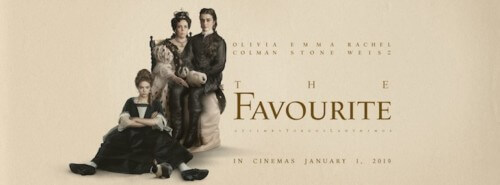The Favourite (2019) Review
The Favourite (2019)
Director: Yorgos Lanthimos
Screenwriters: Deborah Davis, Tony McNamara
Starring: Olivia Colman, Rachel Weisz, Emma Stone, Nicholas Hoult, Mark Gatiss, Joe Alwyn
An early reading of the C word by Nicholas Hoult set the tone for Yorgos Lanthimos’ latest dark comedy, the delectable dialogue of this subversive period drama being as much of a high point of this film as its framing of the set decoration for which it is at first most striking.
“He had charm to burn, and I guess he did”, Weisz’s Lady Sarah Marlborough explains of an off-screen character in the midst of the film’s opening moments, the reference being seemingly as much about the director of this piece as any fictional character in the world he brought to life, Lanthimos’ very particular and unique vision often criticised for blanketing itself in the director’s off-kilter sensibilities. The Favourite was hardly any different, only quite obviously more grandiose in scope, itself confronting the odd notion of the British period drama (and thus the unneeded extravagance of privilege) with an unflinching eye that was both in-keeping with the sheer absurdity of the class divide at the time and the current culture that still salutes it.
One particular scene, which presents Weisz’s high ranking Lady dancing vigorously with a young Lord, is so damming in how over the top it is that it’s bound to draw a laugh from even the most expectant of cinema goers, the scene doubling down as an attack on how ostentatious royal balls are, whether in a period drama or indeed in real life.
The Favourite is perhaps not as note perfect as Lanthimos’ The Lobster, the 2015 release being arguably the most neat and tightly cut of all of his work and a piece that manages to find the comedy in tragedy at just the right note, but the ambition is much greater in this release and the individual elements of cinematography, set, acting, screenplay and editing are each of such an extraordinarily high standard that The Favourite is perhaps the more rich of the two offerings overall.
There seems, throughout every aspect of the film, layers to unravel in search of yet more satisfaction, The Favourite taking clear inspiration from the very best of the period drama sub-genre, Kubrick’s Barry Lyndon included, to offer more than just fancy set dressing and its own historically inaccurate take on privileged Britain.
It was however the Golden Era of Hollywood that seemed to provide the most inspiration for this piece, at least from a visual perspective, a throwback editing style of phenomenal cross-fades complimenting the timeless close-ups to offer a smart and stylish visual palette worthy of a museum, as well as some of the very best lighting put to screen in years.
Messrs Stone, Weisz and Colman were each truly wonderful as the centrepieces around whom the film was constructed, their awards season recognition being entirely deserved for delivering performances that required a mix of astute comedic timing, moments of blind viciousness and a surprising fragility, Colman’s performance as Queen Anne being the standout and therefore making her a clear Oscar front-runner. In support of the central most trio upon whom the film was rested was a plethora of British male talent headlined by Nicholas Hoult, an actor with an increasing presence as a widely acknowledged top class performer and the actor whom stole almost every scene he was in with a camp extravagance that was the source of many of the picture’s biggest laughs.
As is so typical of Lanthimos’ films, the director afforded his cast the time and space through which to earn their rave reviews, often lingering on their reactions to opposing dialogue for just a stretch longer than would ordinarily be the case, the very deliberate choice to avoid typical conversational camera choices creating an atmosphere much like a stage play while simultaneously crafting each frame as if a renaissance painting, the beauty simply pouring from the screen as the performances engaged and the narrative revealed itself piece by piece via a series of miniature revelations.
The Favourite is by no means a typical period drama and nor should we judge it as such given the history of its director, but it did offer all of the splendour expected of such a film and was terrifically constructed from top to bottom, everything from the dialogue to the score forging its own point of interest for one of the most satisfying viewing experiences of this awards season – a truly spectacular achievement.
22/24
[DISPLAY_ULTIMATE_SOCIAL_ICONS]


